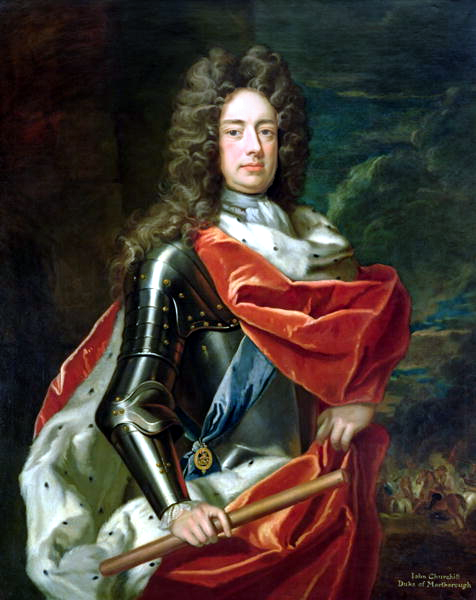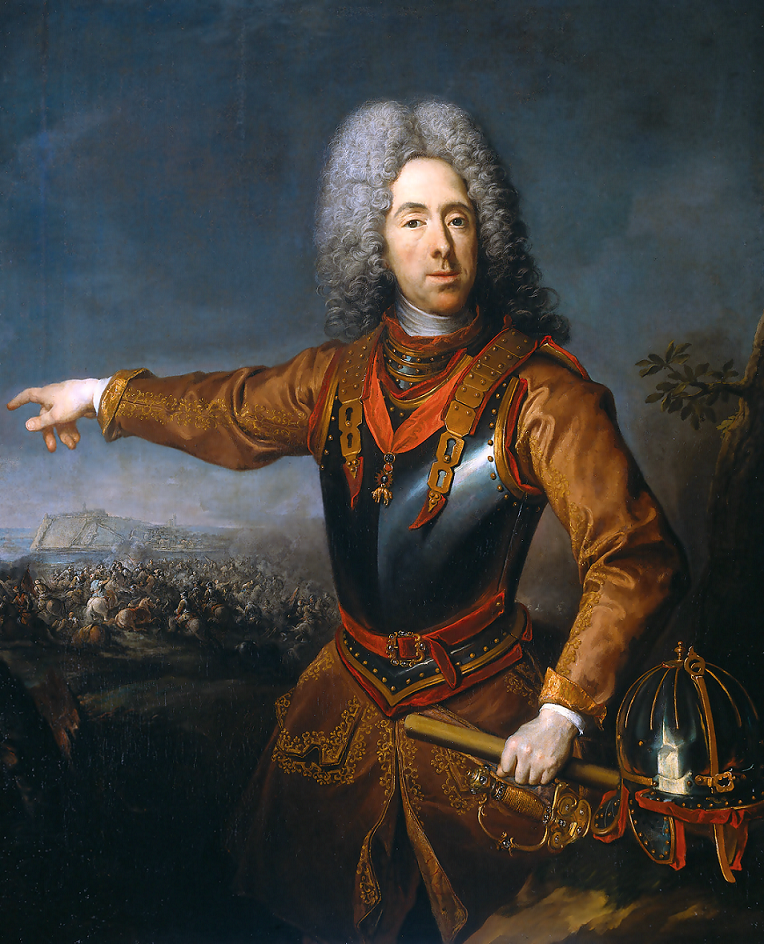
Finest Hour 176
Churchill’s Marlborough as the “Sum of Things”

The First Duke of Marlborough
September 8, 2017
Finest Hour 176, Spring 2017
Page 32
By John von Heyking
Winston Churchill wrote his biography of his great ancestor John Churchill, the first Duke of Marlborough, ostensibly to counter the claims of Thomas Babington Macaulay and other historians about Marlborough’s apparent failures as a military commander, his corruption and selfishness, his reliance upon Prince Eugene’s professional knowledge for his victories, and sheer luck. All culminated in what Churchill characterized as “Macaulay’s story of the betrayal of the expedition against Brest” that was “an obstacle I could not face.”1 Churchill faced and repudiated it along with the other charges and presents Marlborough instead as the greatest military and political leader Great Britain has ever known.
More than Churchill’s attempt to save Marlborough’s reputation, however, what strikes the reader with this biography, published first in 1933 with subsequent volumes appearing up until 1938 (the time of the Munich Agreement), are the parallels Churchill draws with his contemporary situation. Marlborough was written during the important “wilderness years” and led his wife Clementine to claim that writing it had taught him patience.
From Student to Practitioner
Churchill applied many lessons from Marlborough to his own fight against Hitler. The main threat to British liberty and security was a despot in the middle of the continent; Marlborough had to lead an alliance of continental nations against that despot and encircle him on several fronts; naval control of the Mediterranean was necessary before engaging the enemy on the continent (an instance of requiring patience); there was necessity for a vast network of personal spies; Marlborough had military command but lacked leadership of the House of Commons, which Churchill would make a point of combining when he became prime minister; there was a necessity of keeping friendships and covenants with allies as a way of preserving not only national honour but also national security and prosperity; and perhaps most important of all, friendship with one’s greatest ally with whom to share a Clausewitzian coup d’œil of the whole scene and to inspire member armies to fight “as if they were the army of a single nation.”2
The capacity to form friendships, not just alliances or strategic partnerships, is, with magnanimity and political and military prudence, the central criterion Churchill applied to judging Marlborough and those he associated with. He understood friendship roughly the same way that Aristotle described virtuous friendship, and that is the standard Churchill used to judge the success or failure of the historic figures he examined in his biography. For instance, Churchill saw King William III as competent with a good strategic mind, but lacking Marlborough’s ability to develop a network of friends to achieve strategic objectives. He had strong relations with Princess (later Queen) Anne, Lord Godolphin (the Treasurer), and Speaker of the House of Commons Robert Harley, whose friendship Marlborough used to influence that institution. “The Cockpit friendships,” the name derived from the home of Princess Anne, were, in Churchill’s words, “the crucible from which the power and glory of England were soon to rise gleaming among nations.”3 Marlborough’s most important connection was that with his wife Sarah, who was Anne’s personal confidante. On the field of battle, however, the Marlborough friendship that most stands out is that he had with Prince Eugene of Savoy.

2024 International Churchill Conference
Prince Eugene
The friendship of Marlborough and Eugene was based largely upon the power they had over their respective armies and their alliance. It began in the letters they shared with one another in 1701–02, which led them to meet and cement their friendship in a banquet on 10 June 1704:
Then at once began that glorious brotherhood in arms which neither victory nor misfortune could disturb, before which jealousy and misunderstanding were powerless, and of which the history of war furnishes no equal example. The two men took to one another from the outset. They both thought and spoke about war in the same way, measured the vast forces at work by the same standards, and above all alike looked to a great battle with its awful risks as the means by which their problems would be solved.4
Elsewhere Churchill claims: “So perfect was the harmony which the ascendancy of Marlborough and Eugene exercised upon all minds that these soldiers of different races, creeds, and Governments—English, Scots, Irish, Danes, Prussians, Hanoverians, Hessians, Saxons, Palatines, and Dutch—acted together as if they were the army of a single nation.”5 Churchill would undoubtedly have held this example in mind during the Second World War, when he and Roosevelt used their friendship to forge their alliance.

Marlborough and Eugene felt the strains of each other’s battles as if they were each man’s own, and Eugene offered succor to Marlborough, who suffered from depression. Eugene signed some of his letters to Marlborough, “Your affectionate Cousin,” and Marlborough claimed, “I not only esteem, but really love that Prince.”6 Churchill describes their friendship in terms comparable to Aris- totle’s language of virtuous friends as one’s “second self.”
Churchill’s comment echoes Clausewitz’s notion of the coup d’œil, whereby genius is capable of perceiving the whole scene. Churchill states the capacity of viewing the scene “must be evolved from the eye and brain and soul of a single man, which from hour to hour are making subconsciously all the unweighable adjustments, no doubt with many errors, but with an ultimate practical accuracy.”7 Yet later he claims “no one can comprehend the movements leading up to the battle of Blenheim unless he realizes that Eugene and Marlborough were working like two lobes of the same brain. They were in constant touch with one another.”8 Churchill claims of Marlborough’s victory at Malplaquet: “Marlborough’s fame, his influence upon the Continent, his comradeship with Eugene, had compelled the tremendous event.”9
Shared Vision
Churchill suggests Marlborough and Eugene enjoyed not just a Clausewitzian coup d’œil separately as individuals, but together as friends. His analysis is comparable to the way that Aristotle describes the peak of friendship as a joint intellectual perception, in Greek sunaisthesis, the joint or mutual perception of the good whereby friends behold one another inseparably as they behold the good. For Churchill then, it seems their military and political success was predicated upon this sunaisthetic coup d’œil. That shared vision enabled them also to view their friendship not only as one of shared political and strategic vision, but also as the very purpose of that statecraft. Their friendship seemed to be based upon something higher than mere politics or strategy.
The pair had fun together. They were at play together. As warriors they sought the “decisive battle” that would defeat Louis XIV once and for all. But they also saw it as the primary means of testing their mettle as warriors, indeed their virtue, their very moral ethos. Churchill explains the importance of the Battle of Blenheim: “With pride and pleasure they rejoiced in each other’s companionship and in their conviction that the whole war must be put to the test at dawn.”10
Despite Churchill’s emphasis on their equality, he admits that Marlborough was the superior because he was the grand commander of the allied forces against Louis XIV. Churchill observes of Marlborough’s Machiavellian mind: “As clever at piercing the hidden designs of his enemy as in beating him on the field of battle, he united the cunning of the fox to the force of the lion.”11 Later Churchill claims Marlborough “…acted thus in the interests of right strategy and of the common cause as he conceived them. He was accustomed by the conditions under which he fought to be continually deceiving friends for their goods and foes for their bane.”12
Churchill does not explicitly specify the way Marlborough deceived Eugene for his good, but the problems that arose over Marlborough’s wish to put Toulon to siege would be one example. Churchill observes, however, that in the case of the siege of Toulon, which Eugene had opposed and had suffered so much in waging, Marlborough regretted forcing Eugene to go along with his plan on account of the cost it had on their friendship as well as on the war effort: “But the cost was measureless. A year’s campaign must be used; a year of political attrition at home; a year of waning comradeship through the Alliance. High stakes for Toulon!”13 Marlborough regretted the manner in which his disagreement with Eugene harmed their friendship and their capacity to pursue strategic objectives.
After Marlborough was removed from office, Eugene paid a visit to him in London in early 1712 as a gesture of loyalty and support for his friend. It was a tense time. There were rumors the two would wage a coup d’état. Eugene made the rounds, meeting various politicians and important people. Churchill provides little detail on their own time together, highlighting instead Eugene’s public demonstrations of his friendship with Marlborough during this time when Marlborough was suffering political attacks from all directions: “Thus did the famous Prince and warrior proclaim his friendship for his comrade of so many glorious days.”14
The Friend of Marlborough
Churchill’s tale of Marlborough’s achievements and friendships is a tale as well of the civic friendship of England, whose story at this stage is “completed” by Churchill the bard, practitioner, and theorist of political friendship. The biography is Churchill’s greatest statement of his political wisdom, which he sums up in terms of the practice of virtuous friendship: “One rule of conduct alone survives as a guide to men in their wanderings: fidelity to covenants, the honour of soldiers, and the hatred of causing human woe.”15
Churchill reads Marlborough as his contemporary and he hints how Marlborough’s statecraft and his conduct of a war on the continent will provide the model for what needs to be done with Nazi Germany. In writing the biography and thus preparing for his own statecraft, Churchill became the friend of Marlborough best equipped to judge his character. In telling the story of Marlborough and of Great Britain in the biography, Churchill found his other self in his great ancestor.
John von Heyking teaches at the University of Lethbridge. This article is an abbreviation of material in his forthcoming book from St. Augustine’s Press “Absolute Selflessness”: Winston Churchill on Politics as Friendship.
Endnotes
1. Winston S. Churchill, Marlborough: His Life and Times, vol. 1, (Chicago: University of Chicago Press, 2002), p. 18.
2. Winston S. Churchill, Marlborough: His Life and Times, vol. II, (Chicago: University of Chicago Press, 2002), p. 601.
3. Marlborough I, p. 349.
4. Ibid. p. 774.
5. Marlborough II, p. 601.
6. Ibid., pp. 251, 182, and 220.
7. Marlborough I, p. 569.
8. Ibid., p. 825.
9. Marlborough II, p. 646.
10. Marlborough I, p. 843.
11. Ibid., p. 761.
12. Marlborough II, p. 303.
13. Ibid., p. 259.
14. Ibid., p. 926.
15. Ibid., p. 996.
Subscribe
WANT MORE?
Get the Churchill Bulletin delivered to your inbox once a month.


